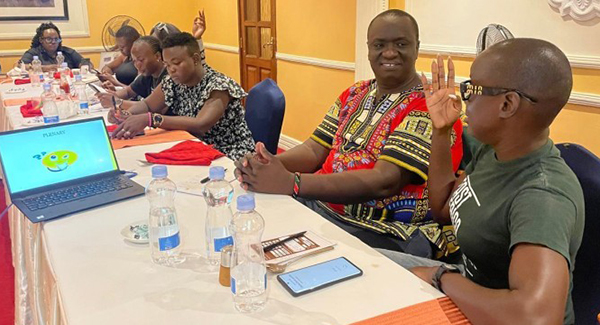Kisumu Meeting Unites Youth Leaders and Influencers to Tackle Gender-Based Violence and Femicide
In a bold and timely move to address the escalating crisis of Gender-Based Violence (GBV) and femicide in Kenya, the Kisumu Regional Team of the National Gender and Equality Commission (NGEC), under the leadership of Davis Okeyo, convened a high-level breakfast meeting with social media influencers on Thursday morning in Kisumu City.
The engagement brought together some of the region’s most vocal digital content creators and young changemakers, marking a significant step in the national effort to harness the power of social media to combat violence and promote accountability.
Held at a city hotel, the meeting centred on exploring how digital platforms such as WhatsApp, Facebook, TikTok, and X (formerly Twitter) are increasingly becoming potent tools for awareness, mobilisation, and resistance— particularly among Kenya’s youth.
With recent statistics showing that 77 per cent of young Kenyans are active on social media, the discussions highlighted the potential of digital advocacy in amplifying survivor stories, demanding justice, and reshaping societal narratives around GBV and femicide.
“Social media has become more than just a tool for connection; it is now a frontline space for activism,” said Davis Okeyo, “Young people are reclaiming their voices and using digital spaces to speak out against violence, discrimination, and impunity. We want to strengthen and support this momentum.”
According to recent data from the Communications Authority of Kenya, 77 percent of young Kenyans are active on at least one social media platform. WhatsApp, Facebook, TikTok, and Instagram are now emerging not only as entertainment hubs but also as dynamic spaces for civic engagement and mobilisation. This demographic—tech-savvy, outspoken, and socially conscious —is playing a crucial role in shaping public discourse, from trending hashtags like #StopGBV to viral TikTok videos advocating for survivors' rights. Their ability to spark nationwide conversations with a single post, meme, or livestream has fundamentally transformed the landscape of grassroots activism.
“We’ve seen the kind of momentum that can be built online. When we amplify the right messages, change follows,” said Linet, a TikTok content creator and human rights advocate who attended the session. “Our platforms have become microphones for the voiceless.”
The backdrop to the meeting is a country still reeling from recent high-profile cases of femicide, including the brutal killings of several young women whose stories dominated national headlines and social feeds in recent months. The tragic incidents have galvanised public outrage, triggering protests, candlelight vigils, and viral hashtags calling for justice and reforms.
Recognising the power of social media to spotlight injustice and influence public policy, the Kisumu Regional Team urged influencers to become proactive agents of change—not just by posting, but by curating content that educates, inspires, and mobilises.
The NGEC team shared insights into the Commission’s ongoing efforts to reduce GBV across the country, including community sensitisation, policy reform advocacy, and data-driven approaches. However, they underscored the need to expand their communication toolkit to include a more robust digital strategy—one that embraces the creativity and authenticity of youth-led engagement.
As Kenya grapples with the complex realities of GBV and femicide, the Kisumu initiative stands out as a beacon of what’s possible when public institutions and citizens collaborate.
Davis Okeyo of the Kisumu Regional Office engages with social media influencers during a breakfast meeting.


Comments